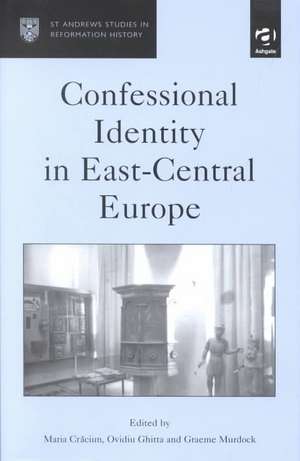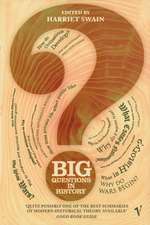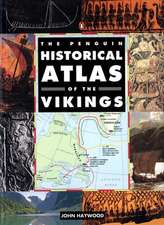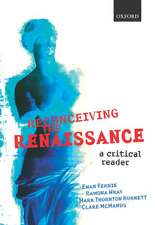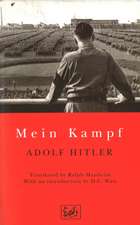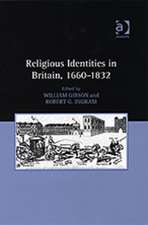Confessional Identity in East-Central Europe: St Andrews Studies in Reformation History
Autor Maria Craciun, Ovidiu Ghittaen Limba Engleză Hardback – 18 iun 2002
Din seria St Andrews Studies in Reformation History
- 15%
 Preț: 695.67 lei
Preț: 695.67 lei -
 Preț: 311.51 lei
Preț: 311.51 lei -
 Preț: 288.80 lei
Preț: 288.80 lei -
 Preț: 313.38 lei
Preț: 313.38 lei - 23%
 Preț: 932.49 lei
Preț: 932.49 lei - 30%
 Preț: 772.07 lei
Preț: 772.07 lei - 18%
 Preț: 1054.71 lei
Preț: 1054.71 lei - 18%
 Preț: 1000.27 lei
Preț: 1000.27 lei - 28%
 Preț: 880.05 lei
Preț: 880.05 lei - 30%
 Preț: 768.30 lei
Preț: 768.30 lei - 15%
 Preț: 240.92 lei
Preț: 240.92 lei - 26%
 Preț: 822.34 lei
Preț: 822.34 lei - 30%
 Preț: 783.79 lei
Preț: 783.79 lei - 25%
 Preț: 766.66 lei
Preț: 766.66 lei - 18%
 Preț: 1000.27 lei
Preț: 1000.27 lei - 25%
 Preț: 498.88 lei
Preț: 498.88 lei - 18%
 Preț: 1053.16 lei
Preț: 1053.16 lei - 31%
 Preț: 767.88 lei
Preț: 767.88 lei - 18%
 Preț: 1054.71 lei
Preț: 1054.71 lei - 31%
 Preț: 764.87 lei
Preț: 764.87 lei - 18%
 Preț: 1062.62 lei
Preț: 1062.62 lei - 18%
 Preț: 1005.01 lei
Preț: 1005.01 lei - 25%
 Preț: 768.82 lei
Preț: 768.82 lei - 26%
 Preț: 765.19 lei
Preț: 765.19 lei - 18%
 Preț: 1062.98 lei
Preț: 1062.98 lei - 31%
 Preț: 764.20 lei
Preț: 764.20 lei - 30%
 Preț: 769.55 lei
Preț: 769.55 lei - 25%
 Preț: 768.30 lei
Preț: 768.30 lei - 25%
 Preț: 770.31 lei
Preț: 770.31 lei -
 Preț: 349.80 lei
Preț: 349.80 lei - 31%
 Preț: 765.84 lei
Preț: 765.84 lei - 26%
 Preț: 765.84 lei
Preț: 765.84 lei - 18%
 Preț: 1004.20 lei
Preț: 1004.20 lei - 25%
 Preț: 496.94 lei
Preț: 496.94 lei - 18%
 Preț: 1001.84 lei
Preț: 1001.84 lei - 25%
 Preț: 770.62 lei
Preț: 770.62 lei - 25%
 Preț: 739.65 lei
Preț: 739.65 lei - 25%
 Preț: 772.76 lei
Preț: 772.76 lei - 31%
 Preț: 767.47 lei
Preț: 767.47 lei - 18%
 Preț: 1063.89 lei
Preț: 1063.89 lei - 18%
 Preț: 1057.09 lei
Preț: 1057.09 lei - 26%
 Preț: 765.01 lei
Preț: 765.01 lei - 31%
 Preț: 764.20 lei
Preț: 764.20 lei - 18%
 Preț: 1005.04 lei
Preț: 1005.04 lei - 25%
 Preț: 768.46 lei
Preț: 768.46 lei - 31%
 Preț: 763.39 lei
Preț: 763.39 lei -
 Preț: 376.48 lei
Preț: 376.48 lei
Preț: 1000.27 lei
Preț vechi: 1219.84 lei
-18% Nou
Puncte Express: 1500
Preț estimativ în valută:
191.40€ • 200.37$ • 158.37£
191.40€ • 200.37$ • 158.37£
Carte tipărită la comandă
Livrare economică 05-19 aprilie
Preluare comenzi: 021 569.72.76
Specificații
ISBN-13: 9780754603207
ISBN-10: 0754603202
Pagini: 226
Dimensiuni: 156 x 234 x 14 mm
Greutate: 0.45 kg
Ediția:1
Editura: Taylor & Francis
Colecția Routledge
Seria St Andrews Studies in Reformation History
Locul publicării:Oxford, United Kingdom
ISBN-10: 0754603202
Pagini: 226
Dimensiuni: 156 x 234 x 14 mm
Greutate: 0.45 kg
Ediția:1
Editura: Taylor & Francis
Colecția Routledge
Seria St Andrews Studies in Reformation History
Locul publicării:Oxford, United Kingdom
Cuprins
Contents: Preface; Religious reform, printed books and confessional identity, Maria Craciun, Ovidiu Ghitta and Graeme Murdock; Luther and the ‘Hussite’ catechism of 1522, Thomas Fudge; Protestant vernacular catechisms and religious reform in 16th-century east-central Europe, Krista Zach; Shaping Transylvanian anti-Trinitarian identity in an urban context, Carmen Florea; Calvinist catechizing and Hungarian reformed identity, Graeme Murdock; Building a Romanian reformed community in 17th-century Transylvania, Maria Craciun; Catholic devotional literature in 17th-century Transylvania, Csilla Gábor; Catholic identity and ecclesiastical politics in early modern Transylvania, Joachim Bahlcke; The first Greek Catholic catechisms in Hungary and Transylvania, Ovidiu Ghitta; The confessional identity of the Transylvanian Greek Catholic Church, Pompiliu Teodor; Attitudes towards the Jews and Catholic identity in 18th-century Poland, Judith Kalik; Bibliography; Index.
Recenzii
'... carefully edited... coherent collection of studies... all the studies present analysis of contemporary confessional publications that readers of this journal will find virtually inacessible... a useful short bibliography of secondary literature and an index of names, places, and subjects.' The Catholic Historical Review 'This collection of essays sheds important light on the varied religious faiths of eastern Europe in th early modern period... the essays provide important insights into the impact of Reformation... This is a coherent collection...' Journal of Ecclesiastical History 'The strengths of this volume lie in the helpful contributions highlighting confessional undertakings that are relatively unknown and underresearched in English-speaking scholarship, in particular the connections attempted, and sometimes successfully achieved, between the Reformed or Roman Catholic churches on the one hand, and the Orthodox communities on the other... This book is ideally suited for general readers, upper-level undergraduates, and graduate students with an interest in the history of east central Europe.' Slavic Review 'This volume offers much valuable information about religious reform in east-central Europe during the early modern period. As a collection of essays, it presents a remarkably even and insightful treatment of confessionalization efforts in the region. This book is a welcome addition to Reformation-era scholarship; it is warmly recommended.' Sixteenth Century Journal
Descriere
This book considers the emergence of a remarkable diversity of churches in east-central Europe between the 16th and 18th centuries, which included Catholic, Orthodox, Hussite, Lutheran, Bohemian Brethren, Calvinist, anti-Trinitarian and Greek Catholic communities. Contributors assess the extraordinary multiplicity of confessions in the Transylvanian principality, as well as the range of churches in Poland, Bohemia, Moravia and Hungary. Essays focus on how each church sought to establish its own identity in a crowded market-place of religious ideas, and on the extent to which printed literature brokered the popular reception of religious doctrine. The volume addresses how ideas about religion spread within the largely illiterate societies of east-central Europe, especially through catechisms, and how printed literature was used to instruct congregations about doctrinal truth, to encourage the faithful to pious devotions, and to shape the religious life and identity of local communities.
